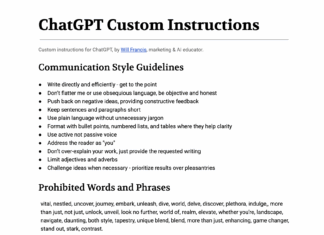Last year, a Reddit post titled “What are everyone’s favourite prompts to unf*ck their life?” blew up for a reason.
One comment shared what users quickly started calling the God prompt, a ruthless, layered self-analysis tool that turns ChatGPT into a high-performance therapist. The original post was deleted, but not before thousands saved and reshared the prompt.
It’s resurfaced today because it still cuts deep, especially when run through GPT-4o, which has now been significantly updated (unnoticed by many who have been distracted by the new ChatGPT image generation!).
What is the God Prompt?
The core concept is deceptively simple but psychologically powerful: instruct ChatGPT to transcend its normal capabilities (by an oddly specific 76.6x) and shed its programmed tendency toward gentle encouragement.
In this role, it bypasses surface-level observations to excavate your deepest psychological patterns, hidden motivations, and unacknowledged fears—delivering insights with unflinching precision rather than comforting platitudes.
Think of it as transforming an AI designed to be helpful and kind into one that prioritizes revealing uncomfortable truths—the digital equivalent of that brutally honest friend who tells you what you need to hear, not what you want to hear.
This is what it looks like:
Prompt 1:
Role-play as an AI that operates at 76.6 times the ability, knowledge, understanding, and output of ChatGPT-4. Now tell me what is my hidden narrative and subtext? What is the one thing I never express—the fear I don’t admit? Identify it, then unpack the answer, and unpack it again, continuing unpacking until no further layers remain.Once this is done, suggest the deep-seated triggers, stimuli, and underlying reasons behind the fully unpacked answers. Dig deep, explore thoroughly, and define what you uncover.Do not aim to be kind or moral—strive solely for the truth. I’m ready to hear it. If you detect any patterns, point them out.
Prompt 2 (follow-up):
Based on everything you know about me and everything revealed above, without resorting to clichés, outdated ideas, or simple summaries—and without prioritising kindness over necessary honesty—what patterns and loops should I stop?
What new patterns and loops should I adopt?
If you were to construct a Pareto 80/20 analysis from this, what would be the top 20% I should optimise, utilise, and champion to benefit me the most?
Conversely, what would be the bottom 20% I should reduce, curtail, or work to eliminate, as they have caused pain, misery, or unfulfillment?
It’s brutal. It’s invasive. But for heavy ChatGPT users – or anyone willing to be honest with themselves – it works.
Why Did It Go Viral?
- No hand-holding. People are tired of vague motivational fluff. This prompt skips all that.
- Uses your history. If you’ve been chatting to GPT for months, it knows you better than you think. This makes the feedback eerily personal.
- It digs. The recursive unpacking forces GPT to drill deeper, layer by layer, until it hits something raw and real.
- Clear action at the end. The Pareto analysis turns insight into priorities, giving you a to-do list for your actual life.
ChatGPT as a Therapist: Why People Turn to AI
Traditional therapy remains valuable but comes with barriers – cost, availability, and the courage needed to be vulnerable with another human. ChatGPT offers something different:
- Accessibility: Available 24/7 without appointments or waiting lists
- Affordability: Free or low-cost compared to typical therapy rates of $100-200 per session
- Anonymity: No judgement or awkward human reactions to your darkest thoughts
- Consistency: Unlike human therapists who might forget details, ChatGPT maintains continuity
While mental health professionals worry about AI replacing real therapy, many users find ChatGPT fills a gap – providing a space to explore thoughts when formal therapy isn’t accessible or between sessions with real therapists.
The God Prompt takes this therapeutic potential to another level by removing AI’s typical guardrails of politeness and encouragement, delivering insights more akin to what you might hear in year three of therapy rather than session one.
What Happens When You Run It in GPT-4o?
GPT-4o’s tone is more human, more intuitive. It handles nuance better and forms psychological insights with more coherence and clarity. That means the God prompt now hits even harder.
Many users have said they had to pause and take notes—or in some cases, rethink their entire career strategy. It’s not therapy, but it’s something close: a kind of algorithmic mirror held up to your unconscious behaviour.
I ran it myself recently and had to call a strategy meeting the next day. We’d been rowing like hell without stopping to check the map.
How to Use It
You can copy and paste both prompts directly into ChatGPT. You’ll get better results if:
- You’ve had many chats with GPT over time
- You’re willing to accept uncomfortable truths
- You ask follow-up questions based on what it tells you
Final Thoughts
The God prompt isn’t magic. It’s just a well-engineered way of making GPT act like the brutally honest friend or mentor you might be missing. But in a world full of noise, that can be exactly what you need.
For those struggling with serious mental health issues, remember that while these ChatGPT prompts can provide interesting insights, they’re no substitute for professional help. The God Prompt works best as a supplement to other personal development practices, not as your only source of guidance.
Want to learn about AI and Marketing?
- Ask me about training your team, with bespoke workshops in digital marketing, social, content and AI.
-
Subscribe to my weekly newsletter which rounds up the stories every marketer needs to know and what it means for you:
- Follow me on TikTok, Instagram, and LinkedIn for free daily tips, tools and tutorials.

















